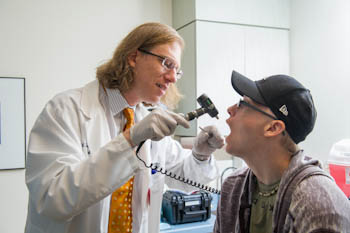How to Prevent Mouth Problems During Cancer Treatment
Chemotherapy and radiation are often prescribed because they are both very effective at destroying cells that grow rapidly, such as cancer cells. Unfortunately, they can also harm healthy cells that grow quickly, such as the cells lining the inside of your mouth. Patients undergoing chemo or radiation treatment often report mouth problems, such as sores, dry mouth, or infections, because the treatments make it difficult for the mouth to heal itself and fend off germs.
To help prevent or minimize mouth problems, consider these tips:

Nathaniel Treister, DMD, DMSc, a stem cell transplant oral health provider, examines a patient.
- See your dentist. Try to see your dentist before treatment begins, so he or she can conduct a thorough teeth cleaning and check for potential sources of dental irritation that may cause problems during cancer treatment. Once treatment begins, be sure to see your dentist again so he or she can watch for any potential issues.
- Maintain good oral health to help prevent infection and tooth decay.Brush three times a day with a soft toothbrush, floss daily, and eat a healthy diet, low in sugar. (However, don’t floss if it causes bleeding when your platelet count is low.)
- To help lessen the symptoms of mouth sores (also called mucositis),ask for ice chips or sugar-free popsicles to suck on while you receive chemotherapy. Research shows that this may help decrease mouth sores.
- Talk with your doctor. He or she may be able to prescribe a medication to help prevent sores and ease discomfort. Your doctor may also recommend over-the-counter pain relievers, such as Tylenol, to help reduce mouth pain.
- Avoid commercial mouthwashes, because they contain alcohol that may burn your mouth. Instead, rinse your mouth with warm salt water or baking soda and water (a teaspoon of either dissolved in eight ounces of warm water).
- Avoid spicy meals and foods that are difficult to chew. Citrus and tomato juice may also irritate your mouth when you have mouth sores. For more guidance, check our tips to alleviate discomfort associated with mouth sores during treatment.
- Drink at least eight glasses of water or juices daily. Drinking fluids throughout the day can help with dry mouth (also called xerostomia). It is also important to avoid caffeinated beverages, because caffeine can increase mouth dryness. Dana-Farber nutritionists offer a number of recipes to help relieve dry mouth.
When your cancer therapy ends, be sure to continue good dental habits to keep teeth and gums healthy. If you’ve had radiation, your salivary glands may be making less saliva, which can put you at greater risk for developing cavities and gum disease. This means you’ll need to schedule regular dental visits and eat a healthy diet. Visit Dana-Farber’s website for more tips for mouth care during and after cancer treatment.

No comments:
Post a Comment